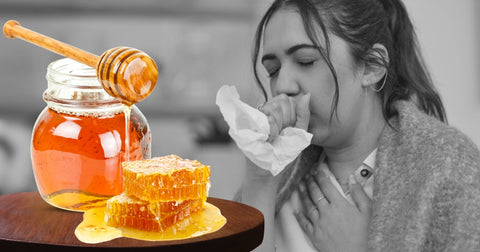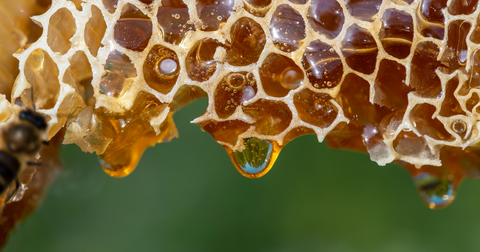Is Honey Bad For Health?

Honey is generally considered safe and beneficial for health when consumed in moderation.
However, there are a few considerations to keep in mind regarding its consumption:
#1. Nutritional Benefits
A. Natural Sweetener:
Honey is often used as a healthier alternative to refined sugar, as it contains vitamins, minerals, and antioxidants.
B. Antioxidant Properties:
Studies show that honey has antioxidant properties that may help reduce inflammation and oxidative stress in the body.
2. Health Conditions
A. Weight Management:

- For those looking to lose weight, using honey as a sweetener should be done carefully, considering its caloric content.
3. Consumption Tips
A. Moderation:
- Enjoy honey in moderation as part of a balanced diet. One or two teaspoons per day can be a reasonable amount for most people.
Honey's natural sweetness and potential health benefits make it a preferable choice over refined sugars, but it’s essential to be mindful of its sugar content and any personal health considerations.
Is Honey In Warm Water Good Or Bad?
Drinking honey in warm water is generally considered beneficial and can offer several health advantages. It offers several health benefits, including digestive support, hydration, and energy boosts, while also being a natural remedy for sore throats.
Here are some of the benefits and considerations:
#1. Benefits of Honey in Warm Water

A. Digestive Aid:
- Honey can help soothe the digestive system and may alleviate issues like indigestion or bloating.
- When mixed with warm water, it can promote better digestion.
B. Hydration:
- Drinking honey in warm water can help keep you hydrated, especially if consumed in the morning.
- Proper hydration is essential for overall health.
Natural Energy Boost:
- Honey is a source of natural sugars (glucose and fructose), providing a quick energy boost and making it a great option for athletes or those needing an energy lift during the day.
D. Soothing Sore Throats:
- Warm water with honey is a popular home remedy for soothing sore throats and coughs.
- Honey's antibacterial properties can help relieve irritation.
Discover how honey helps in soothing sore throats and coughs by reading the detailed blog "The Sweet Healer: Honey for Cough Relief."
#2. Considerations
A. Temperature:
- It’s essential to ensure that the water is warm and not boiling.
- Extremely high temperatures can degrade some of honey's beneficial enzymes and antioxidants.
Is honey bad for teeth?
Honey can have both positive and negative effects on dental health.
While honey has some potential benefits for oral health, its high sugar content and sticky nature can pose risks for tooth decay if consumed excessively and without proper oral hygiene.
Here’s a closer look at how honey can impact your teeth:
#1. Potential Negative Effects
A. High Sugar Content:
- Honey is high in sugars, which can contribute to tooth decay if consumed excessively.
- When sugars from honey are left on the teeth, they can feed bacteria in the mouth, leading to the production of acids that erode tooth enamel and cause cavities.
B. Sticky consistency:
- Honey has a sticky texture, which means it can adhere to teeth and remain in the mouth longer than other sugary foods.
- This prolonged exposure can increase the risk of dental issues if proper oral hygiene is not maintained.
C. Frequency of Consumption:
- Frequent snacking or sipping on honey-containing beverages can increase the risk of cavities, as the sugars are regularly introduced to the mouth.
- This is especially concerning if oral hygiene practices are not followed after consumption.
#2. Potential Positive Effects
A. Antimicrobial Properties:
- Honey has natural antibacterial and antimicrobial properties, particularly in varieties like Manuka honey.
- These properties may help inhibit the growth of harmful bacteria in the mouth, potentially reducing the risk of gum disease and oral infections.
B. Healing Properties:
- Some studies suggest that honey can promote healing and reduce inflammation, which can be beneficial for gum health.
- It may help soothe irritated gums or aid in the recovery of oral wounds.
#3. Tips for Minimising Risks
A. Practice Good Oral Hygiene:
- Brush your teeth at least twice a day and floss daily to remove any residual sugars from honey.
- Consider using fluoride toothpaste to strengthen enamel.
B. Limit Consumption:
- Enjoy honey in moderation and avoid frequent snacking on honey or honey-based products throughout the day to minimise sugar exposure.
C. Rinse with Water:
- After consuming honey, rinse your mouth with water to help wash away any sugar residue and reduce the risk of cavities.
D. Regular Dental Check-Ups:
- Schedule regular dental visits for professional cleanings and check-ups to maintain oral health.
Moderation is key, and maintaining good dental care practices can help mitigate any negative effects.
Is Honey Bad For Cholesterol?
Honey has been studied for its potential effects on cholesterol levels, and the consensus is that it can have a positive impact on cholesterol profiles when consumed in moderation.
Here’s what you need to know about honey and cholesterol:
#1. Potential Benefits of Honey for Cholesterol
A. Rich in Antioxidants:
- Honey contains antioxidants, including flavonoids and phenolic acids, which may help reduce oxidative stress in the body.
- This can contribute to improved heart health and lower LDL (low-density lipoprotein) cholesterol levels, often referred to as "bad" cholesterol.
B. Improves Lipid Profile:
- Studies suggest that regular consumption of honey leads to a reduction in total cholesterol and LDL cholesterol levels while potentially increasing HDL (high-density lipoprotein) cholesterol, known as "good" cholesterol. This can contribute to a healthier lipid profile.
C. Anti-inflammatory Properties:
- The anti-inflammatory properties of honey can also play a role in cardiovascular health, as inflammation is linked to various heart-related conditions.
- By reducing inflammation, honey may indirectly support healthier cholesterol levels.
#2. Considerations
A. Caloric and Sugar Content:
- Honey is high in natural sugars and calories, so moderation is essential.
- Excessive consumption of honey can contribute to weight gain, which is a risk factor for elevated cholesterol levels.
- It’s important to balance honey intake with a healthy diet.
B. Not a Replacement for Medical Treatment:
- While honey can have potential benefits, it should not be seen as a substitute for prescribed medications or lifestyle changes aimed at managing cholesterol levels.
- Individuals with high cholesterol or those at risk for heart disease should consult with healthcare professionals for personalised advice.
Individual Variability:
- The effects of honey on cholesterol can vary between individuals.
- Factors such as overall diet, lifestyle, and genetics can influence how honey impacts cholesterol levels.
Honey, when consumed in moderation, may have a beneficial effect on cholesterol levels due to its antioxidant properties and potential to improve lipid profiles. However, it should be part of a balanced diet and healthy lifestyle.
Is Honey Bad For Liver?
Honey is considered safe and even beneficial for liver health when consumed in moderation.
However, there are some important considerations to keep in mind:
#1. Potential Benefits of Honey for Liver Health
A. Antioxidant Properties:
- Honey contains antioxidants, such as flavonoids and phenolic compounds, which can help combat oxidative stress and inflammation in the liver. This may protect liver cells from damage.
B. Support for Liver Function:
- Studies suggest that honey can support liver function by promoting the detoxification process.
- It may aid in the elimination of harmful substances from the body.
C. Regulation of Blood Sugar:
- Honey has a lower glycaemic index compared to refined sugars.
- When consumed in moderation, it may help regulate blood sugar levels, which can be beneficial for individuals with fatty liver disease.
D. Potential Hepatoprotective Effects:
- Animal studies have indicated that honey has hepatoprotective effects, helping to protect the liver from damage caused by toxins, alcohol, and certain medications.
#2. Considerations
A. High Sugar Content:
- Honey is still high in natural sugars and calories.
- Excessive consumption can contribute to weight gain, which is a risk factor for liver diseases, including non-alcoholic fatty liver disease (NAFLD).
B. Moderation is Key:
- While honey can have health benefits, it should be consumed in moderation.
- Overconsumption of sugars, even from natural sources like honey, can lead to metabolic issues that may negatively impact liver health.
C. Individual Health Conditions:
- Individuals with specific liver conditions (such as advanced liver disease or certain metabolic disorders) should consult their healthcare provider before incorporating honey into their diet, as individual dietary needs can vary.
Honey is not bad for the liver and may even offer some health benefits due to its antioxidant properties and potential to support liver function. However, it's important to consume it as part of a balanced diet and be mindful of overall sugar intake.
Enjoy The Sweetness Of Honey
While honey is a natural sweetener packed with antioxidants and anti-inflammatory properties, it’s essential to be mindful of its sugar content and its effects on dental health and specific conditions like cholesterol and liver health. Drinking honey in warm water can enhance its benefits, promoting digestion and hydration. However, it's crucial to maintain good oral hygiene to prevent any negative effects on teeth.
At Honey and Spice, we encourage you to savour the natural goodness of honey while prioritising balance in your diet.







